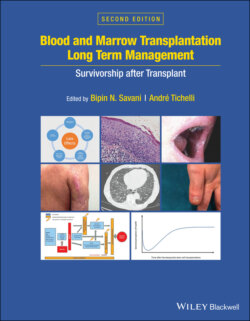Читать книгу Blood and Marrow Transplantation Long Term Management - Группа авторов - Страница 17
Developing resources and a guide for long‐term survivors
ОглавлениеOngoing research is focused on better understanding of late effect issues and prediction of posttransplant long‐term complications, which allows transplant‐eligible patients to incorporate this knowledge into more informative decision making [18,23]. Therefore, significant resources should be focused on the better implementation of how patients and physicians use extensive data regarding posttransplant late complications in clinical care.
With survivorship, a shift in care occurs from large transplant centers to community healthcare providers. As a result, many hematologist/oncologist and primary care physicians are assuming the posttransplant care of long‐term survivors. Preventive measures, as well as early detection and treatments, are important aspects to reducing morbidity and mortality in long‐term survivors after HCT. This book [17] offers the updated practical advice and outlines late effect experts’ personal approaches in managing long‐term survivors after HCT. The management of late HCT effects is important to improve long‐term survival of HCT recipients but should be tailored to the risks specific to the primary disease and transplant type. Future planning should account for the impact of the expected increase in transplant activity and number of survivors on resource utilization.
We also recommend early referral or discussion with a transplant center for enrolment of patients in available late effect studies and for management guidelines. A better understanding of the pathogenesis of late effects will allow for more effective screening to identify patients at risk prior to the HCT procedure, and allow more effective monitoring to detect early evolution of the late effects after HCT. This may, in turn, allow for improved therapeutic decision making while evaluating patients for HCT, and early institution of treatments directed at preventing and treating late effects in patients at risk after HCT. To better inform the needs of the contemporary HCT survivor generation and guide the delivery of late effects services, periodic analysis of new survivor cohorts is needed.
